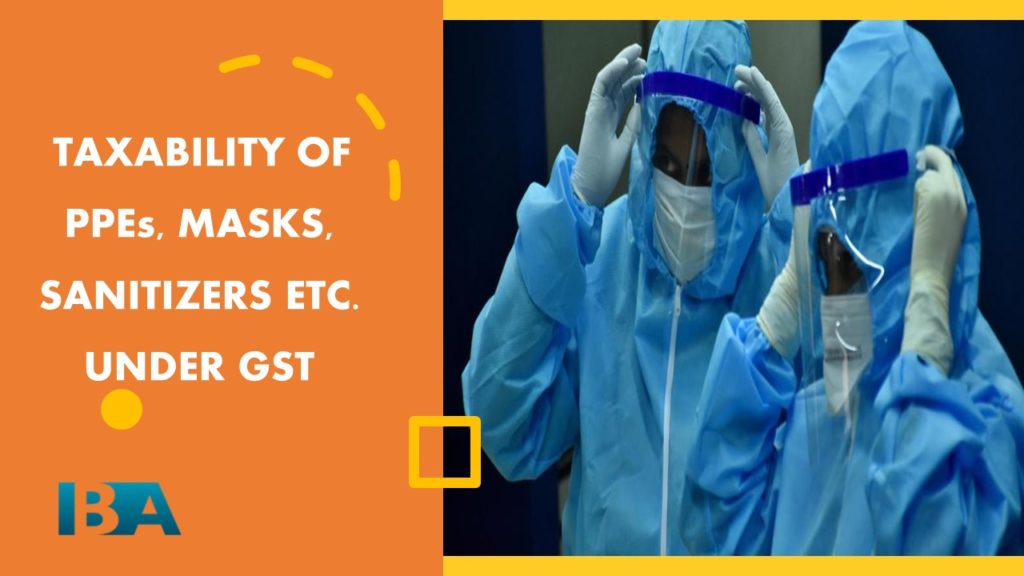- July 22, 2020
- Posted by: IBA LLP
- Category: Articles, Indirect Tax

With the increment in coronavirus affected people on a day-to-day basis, it essential for each one of us to prevent ourselves from this widespread virus. Personal Protective Equipment (PPE), infrared thermometers, masks, sanitizers, hand gloves etc. are essential in such prevention. Demand for these products has increased. Consequently, manufacturing as well as trading of such items has undergone increase on a large scale in the domestic market. Therefore, it becomes important to determine taxability of such items under Goods and Services Tax.
PPEs, masks, sanitizers, rubber gloves etc. are classifiable under different HSN codes and hence liable to differential rates of tax which are discussed as per the table below: –
| HSN Code | Medical Equipment | CGST % | SGST % | IGST % |
| 6210 | Face Mask | 2.5 | 2.5 | 5 |
| 6210 | PPEs (costing up to Rs. 1,000 per piece) | 2.5 | 2.5 | 5 |
| 6210 | PPEs (costing more than Rs. 1,000 per piece) | 6 | 6 | 12 |
| 4015 | Surgical rubber gloves or medical examination rubber gloves | 6 | 6 | 12 |
| 3822 | COVID-19 diagnostic kits and reagents | 6 | 6 | 12 |
| 3808 | Disinfectants and other similar products* | 9 | 9 | 18 |
| 3926 | Protective sheets made of plastic | 9 | 9 | 18 |
| 9025 | Infrared thermometers, pyrometers, barometers and hygrometers | 9 | 9 | 18 |
* The issue of GST rate on alcohol-based hand sanitizers has been reported in few sections of media. In a Press note released by Ministry of Finance on 15th July 2020, it is stated that hand sanitizers attract GST at the rate of 18%. Sanitizers are disinfectants like soaps, anti-bacterial liquids, Dettol, etc. and shall attract duty standard rate of 18%. Further the press note, being clarificatory in nature, clarifies that the inputs for manufacture of sanitizers being chemicals, packing material, input services also attract a GST rate of 18%.
Also, it has been ruled out by the Advance Authority in Advance Ruling No. GOA/GAAR/1 of 2020-21/530 Dated 29th June 2020 that Alcohol based hand sanitizers are classifiable under heading 3808 of HSN to which rate of GST applicable is 18% as per schedule entry notified vide Notification No. 1 Central Tax (Rate) dated 28th June 2017.
Exemption in respect of PPE, masks sanitizers, etc.
Lately, Government has received many recommendations from various stakeholders for a GST exemption on certain items like PPEs, masks, test kits and sanitizers since they are extensively being used in fighting the pandemic.
Sources have said that the Government is not likely to waive off GST on such products contending that tax exemption would lead to blocked input Credit, thus increasing the cost of manufacturing and subsequently, the end cost remains the same.
According to the source, furthermore, the compliance burden would increase for manufacturer, who would be required to maintain a separate account of inputs, input services and capital goods used for manufacture of PPE (exempted items).
Demand for GST exemption on these items got louder when the government exempted PPE, test kits, masks, and ventilators from basic custom duty and appliable cess for period up to September 30. The customs duty was reduced in the larger interest of immediate need of such goods, considering insufficiency of domestic supply meet the increased requirement.
Custom Duty Exemption would lead to advantage to importers and thus, domestic manufacturing will suffer.
Conclusion
It can be interpreted from above that GST is being levied on supply of medical items like PPEs, masks, sanitizers etc by the authorities base on the fact that any exemption would only increase the cost of manufacturing which will ultimately be borne by the end consumer in the form of increased prices. And therefore, per the contention, providing exemption to such items from levying of GST and the resultant increased prices would make the imports cheaper and would be against the soul of ‘Aatmnirbhar Bharat’.
A better alternative here would be to reduce the GST rate to zero, instead of exempting the said items. Thus the tax paid by the end customer would be zero, and at the same time the manufacturer could also take benefit of the Input Tax Credit associated with the said items.
Author: Abhishek Manchanda
